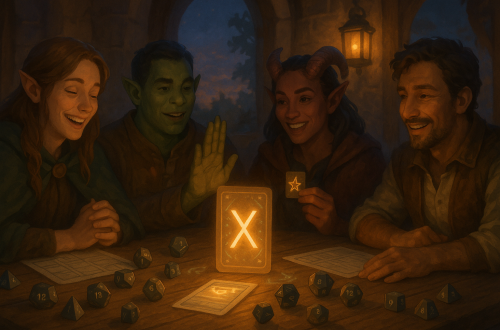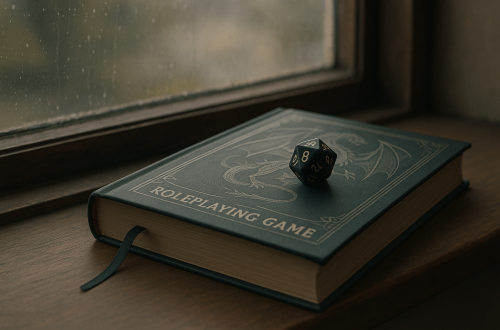Session Zero: The Table Rules
So you’ve chosen your genre and set your tone. The party is assembled, and their backstories are tragic and strangely bird-related. Now comes the question nobody is likely to ask but everyone needs answered:
How do we actually do this together without descending into complete chaos?
Welcome to the part of Session Zero that isn’t always glamorous, but is absolutely essential. This is where you lay down the table rules, the shared understandings that keep the game flowing and help everyone feel respected, heard, and hopefully not covered in food.
First up: Communication
At its core, a TTRPG is a conversation. Its equal parts story, strategy, and improvisation. But even the best conversations can go sideways without some agreements on communication. Obviously each group will be different, but the primary concerns a GM should consider:
- Interruptions: Is it okay to jump in, or should players raise a hang/signal when they want to act?
- Rules-Lawyering: Do you want to stop the game to debate rules, or will the GM make a ruling and it can be researched later?
- Sharing the Spotlight: How will you make sure quieter players get their own chance to shine, without being talked over by more extroverted people?
Having six people yelling over each other at a table means no one gets heard and no quests get done. While I don’t recommend something as extreme as a talking stick at a TTRPG table, it can be helpful if everyone understands that one person speaks at a time.
Pacing and Cadence
This is one of the more practical conversations that needs to be had. How often are you playing? Is that a strict schedule? How long is each session? Some people are able to block out an entire evening every week to play, but some can’t, and a middle ground needs to be found (and fought over). Each group of people will have different obligations and constraints. Personally, I prefer to do a session once every two weeks, on a specific date (every other Saturday, for instance) for four hours. If a player can’t make it, we might reschedule if it’s not too much hassle, like if everyone is available the next day. If it is too much hassle, we will meet without that player and they can come next time. In my experience, asking everyone for availability to schedule around means you will meet approximately once every eighteen years.
What happens if someone can’t make it? Make your own decisions here, but I have always said that the GM will run the character for the session that the player is missing, but the character will not die. Anything else is fair game. If multiple players can’t make it, I’ll usually offer to run a one-shot unrelated to the current adventure. I’ll elaborate on this in a future post in this series.
House Rules
House rules are the instances in which the GM departs from conventional wisdom. There are an infinite number of rules to change, and experience will tell a GM what they do and don’t like, and what changes will be an improvement. Will you allow nat 20s on skill checks to mean automatic success, or stick to the rules-as-written where that only applies to attacks? Are critical fumbles a thing, or just a myth whispered by GMs with a taste for chaos? Maybe you let players drink healing potions as a bonus action, or maybe potions require a full round and a small sonnet. Whatever your preferences, it helps to lay them out clearly at the start, so no one’s surprised mid-battle when gravity suddenly works differently.
I consider dice rules to fall into the house rules category. The whole point of dice is that they are tiny agents of chaos, and their capacity for madness is infinite. Will your table require dice trays? Do rolls need to be visible to everyone at the table? If a roll ends up on the floor, is it cancelled? What about if it lands on the edge of a book so the result of the roll is unclear? Are metal dice allowed? I like dice trays. They protect the table, they keep the dice contained, they keep the player rolls public. Using a dice tray basically means you don’t have to make any of these other decisions.
Snack Diplomacy – The True Battleground
It may sound silly, but these small things matter. Will snacks be part of your sessions? Is there a communal snack pile, or is it every adventurer for themselves? Are there foods that are off-limits because they’re loud, messy, or smell like a dragon’s armpit? Is ordering pizza going to be the norm? What about alcohol? Do allergies need to be considered?
In the end, table rules aren’t about control—they’re about care. They’re how we look after each other while telling stories that are often intense, personal, or just deeply ridiculous. Making all these decisions in Session Zero means not having to argue about them as they come up later. So take the time to have the conversation. Be honest. Be generous. And remember: if someone insists on roleplaying every scene in a gravelly goblin voice, maybe just make sure they have water—and that the rest of you are in on the joke.




